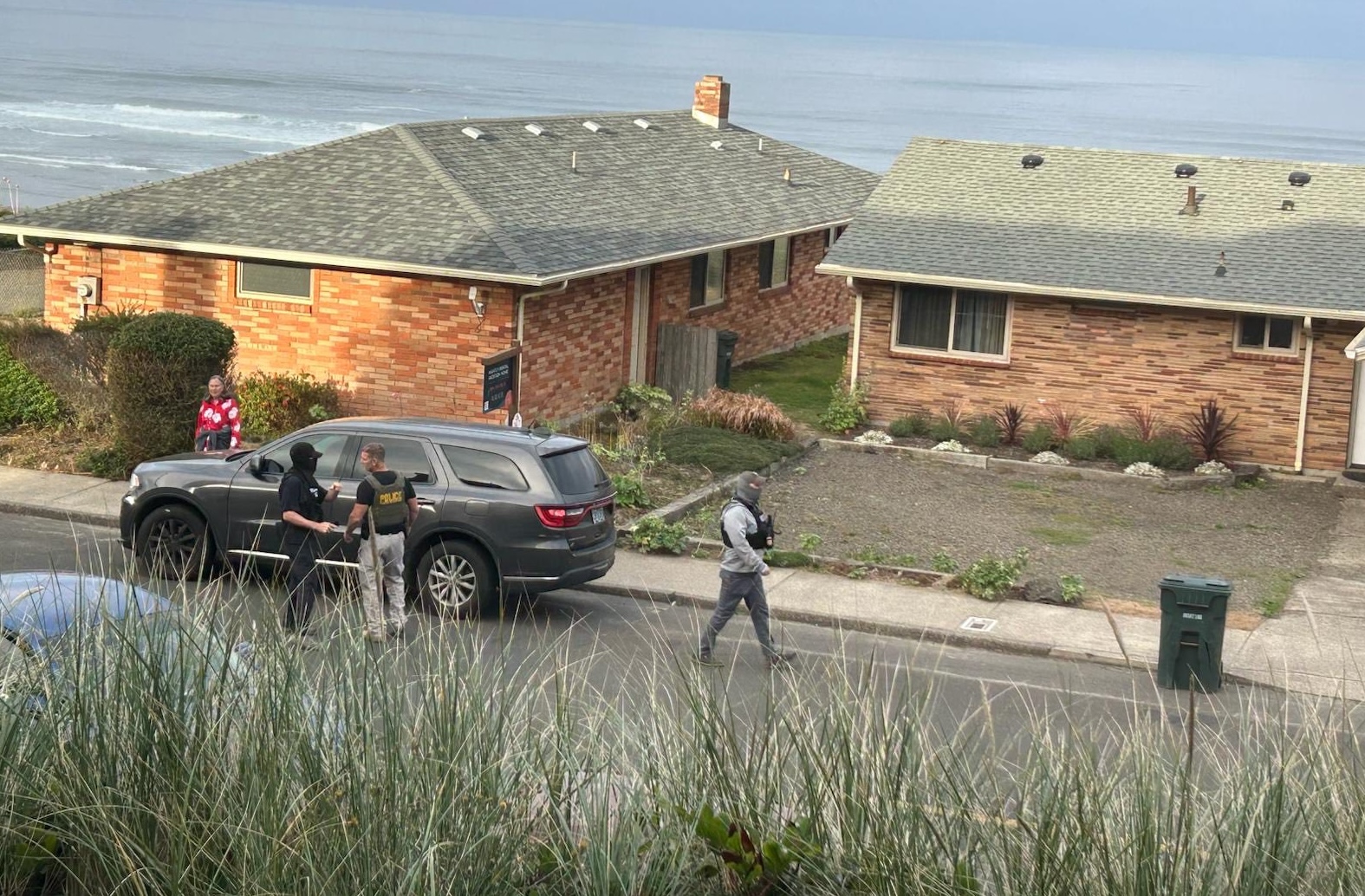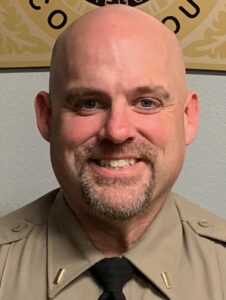
By QUINTON SMITH/Lincoln Chronicle
Lincoln County Sheriff Adam Shanks and some of his counterparts around Oregon are frustrated with U.S. Immigration and Customs Enforcement tactics as federal agents ramp detentions of people suspected of violating immigration laws.
Shanks and 35 Oregon sheriffs held a conference call Wednesday with Seattle-based ICE officials. A statewide sheriff’s organization set up the meeting because many of the law enforcement leaders are frustrated with ICE’s operation rules, lack of communication and by what agents are leaving in the wake of some raids.
“The meetings intent was to try to communicate our concerns … especially not knowing when they are in our communities,” Shanks told the Lincoln Chronicle.
But the sheriff said the result of the meeting “was highly disappointing because of the lack of transparency.”
Clatsop County Sheriff Matt Phillips apparently feels the same way.
Phillips told Clatsop County commissioners after Wednesday’s meeting that ICE operations put local law enforcement in a tough spot because they operate with “a different rulebook.”
“We laid out several instances that brought significant concern, and basically they didn’t blink,” Phillips told commissioners, according to the Astorian newspaper. “They were maybe indifferent to what our concerns were, not responsive or acknowledging them.”
Phillips told Clatsop commissioners the session with ICE officials was “very unproductive.”
Detentions in Oregon jumped dramatically in October, increasing by at least 550 percent compared to previous months, Oregon Public Broadcasting reported last week using data from the Portland Immigrant Rights Coalition. The coalition is a nonprofit hotline that tracks ICE sightings and arrests and provides legal aid to people who have been detained. It confirmed 329 arrests in Oregon in October.
That would be a significant uptick for a single month OPB reported, using federal data collected by two California universities. Between January and July, Oregon, Washington, Idaho and Alaska combined to average 237 arrests per month, the universities said.
Immigration enforcement is especially fraught in the Newport area after last week when it became known that a company working with Homeland Security was inquiring about leasing land adjacent to the Coast Guard station at the Newport airport for a possible detention center. The company dropped the inquiry Wednesday.
Before that, however, a Homeland Security spokesperson told the Chronicle in an email that the agency “is working at turbo speed on cost-effective and innovative ways to deliver on the American people’s mandate to arrest and deport the worst of the worst including gang members, pedophiles, terrorists, rapists, and murderers.”
But Phillips told Clatsop commissioners that’s not what his department is seeing in northwest Oregon.
Phillips said he told ICE officials last week that their tactics “don’t necessarily fit the profile of the person that they’re taking down. … they’re not all taken off the Top 10 Most Wanted list.”
Conflicting laws
The problem for Shanks and other Oregon sheriffs is that they are caught between two conflicting laws. Federal law prohibits local law enforcement from hindering a federal operation, he said, while Oregon law prohibits agencies from aiding federal immigration enforcement.

The result, Shanks says, are ICE agents showing up in communities in unmarked vehicles and with no visible identification without giving a simple heads up to local police.
“One of the main concerns is the lack of identification,” Shanks said. “There’s no badge or clear government identification … and they’re all in unmarked cars.”
And sometimes they leave with families stranded by the side of the road or suspects’ vehicles damaged and abandoned, as was the case in Salem recently.
When that happens, Shanks said, dispatch centers are flooded with calls of the unknown federal operations and local agencies are left to pick up the pieces.
“That makes it very difficult when there’s a car ramming and we get calls and we’re not sure what’s going on,” the sheriff said.
“I think we came away with a clear understanding that they operate under their own rules,” Shanks told the Chronicle.
Federal tactics
The Astorian reported that the sheriffs on Wednesday listed examples of dangerous situations to Scott Meyer, ICE’s interim field office director in Seattle, and other ICE officials.
In one instance, a sheriff said an unidentified ICE vehicle chased a car resulting in a high-speed crash in Salem. In another, ICE agents stopped a woman, took her car keys and identification and left her on the side of the road.
The sheriffs reported that local law enforcement agencies had been flooded recently with calls about abductions and apparent crimes that turned out to be ICE operations, according to Phillips.
According to the Astorian, Phillips said ICE officials said there were increasing numbers of assaults and threats directed at them. They said assaults against their officers were up 1,000 percent, and threats against the families of ICE officers up 8,000 percent.
“I can’t help but wonder if the way they’re conducting business has an impact on that,” said Phillips. “You can do it respectfully and still accomplish the mission.
“This is a very difficult situation,” Phillips told commissioners, according to the Astorian. “Federal law enforcement is able to operate with a lot more liberties than state and local law enforcement. We have to accept that they have a different rulebook.”
Phillips said he also had the impression that the ICE officials Wednesday weren’t aware of what actually was taking place as they said with assurance that their agents always wore vests with clear markings.
“The sheriffs around the room basically laughed and challenged them on that and said, ‘That is not what’s happening in the communities’,” said Phillips.
“My best guess … They’ve brought in (ICE) agents from around the country,” Phillips told The Astorian on Thursday. “They’re focusing on Oregon for a period of time, and then they’re going to go focus on another state.”
- Quinton Smith is the editor of Lincoln Chronicle and can be reached at YachatsNews@gmail.com



















They don’t play by “their own rules,” they are breaking the rules the society has agreed upon. Anybody who thinks they’re above a charge of kidnapping or assault (vehicular or otherwise) needs to identify himself as a legitimate (debatable in this case) law enforcement officer or face the full force of the law.